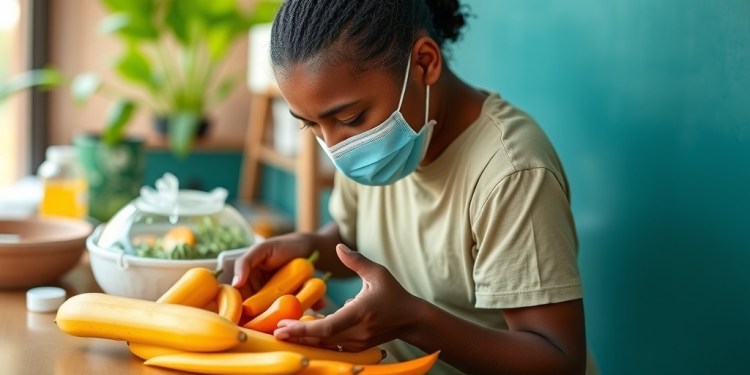During the COVID-19 pandemic, a stark and distressing trend emerged: for the first time in two decades, tuberculosis (TB) mortality rates started to increase significantly. These surges can largely be attributed to the disruptions in essential TB services, including diagnostic delays and interruptions in treatment. However, a new study conducted by a team of researchers from prominent institutions has shed light on another critical factor contributing to this unsettling increase: food insecurity during the pandemic lockdowns.
The research presents a compelling narrative through individual interviews and focus group discussions, primarily focusing on Southern India. What the researchers discovered is alarming: 78% of households reported having no income, while 67% of those families had to resort to distress financing strategies just to put food on the table. Additionally, 44% of the families altered their dietary habits, often resulting in reduced consumption or the substitution of nutritious foods with less beneficial alternatives. These statistics underscore the dire situation faced by many during the lockdown periods and the far-reaching impacts on health, particularly in relation to TB.
As established in public health research, there is a strong correlation between undernutrition and the progression of tuberculosis. This connection elevates the significance of the study’s findings, which suggest that during crises such as the COVID-19 pandemic, food insecurity could exacerbate an already critical health crisis. The research highlights how nutritional deficiencies may lead to higher TB-related mortality rates, particularly among the most vulnerable populations.
Pranay Sinha, MD, an assistant professor at Boston University’s Chobanian & Avedisian School of Medicine and the study’s corresponding author, points out the oversight in focusing solely on service disruptions during the pandemic. He emphasizes the necessity of acknowledging nutritional shocks which can contribute substantially to increased health risks and mortality related to tuberculosis. Sinha argues that decades of research have consistently illustrated how undernutrition not only heightens the risk of TB progression among exposed individuals but also raises the likelihood of death in diagnosed cases.
This research is part of the TB LION project, which stands for Tuberculosis—Learning the Impact of Nutrition. This initiative aimed to extend nutritional support to household contacts of individuals diagnosed with TB in the regions of Puducherry and Tamil Nadu, India. The study included six months of providing calorie-dense food baskets to participants, an intervention that yielded promising results. Those who received nutritional support reported significant improvements in their food security status, experienced weight gain, and felt an enhanced sense of overall well-being. These outcomes strongly point to the vital role that nutritional assistance can play during health crises.
Furthermore, one of the key takeaways from this study is the urgent need for thoughtful planning in response to public health emergencies. The COVID-19 pandemic has shown that responding to immediate medical needs without addressing the underlying nutritional issues can result in compounded crises. It becomes increasingly clear that during such emergencies, nutritional support should not be treated as a secondary concern but as a core component of public health strategies.
To mitigate the effects of food insecurity that may accompany global health crises, it is essential for policymakers and health organizations to integrate food assistance into their emergency response frameworks. This research underlines the fact that vulnerable populations suffer the most during crises, exacerbating health disparities. Addressing food insecurity could be vital in altering the trajectory of diseases like tuberculosis, especially in regions already grappled with high incidences of the disease.
The implications of these findings are far-reaching, not just for TB management but for the broader field of public health. By recognizing the intertwined nature of nutrition and disease management, health systems can develop more holistic approaches that truly address the multifaceted needs of affected populations. The pandemic has created an unprecedented opportunity for re-evaluating traditional health responses, encouraging a shift towards more inclusive strategies that encompass nutritional support.
Furthermore, the emotional and psychological burdens of food insecurity during the pandemic should not be overlooked. Stress, anxiety, and depression are often intertwined with nutritional inadequacy and can further complicate health outcomes, particularly for those suffering from chronic illnesses like TB. As researchers continue to delve into the wider implications of their findings, it becomes critical to ensure that mental health supports also accompany physical health interventions.
In conclusion, the rising TB mortality rates during the COVID-19 pandemic illustrate a complex interplay of various factors influenced by systemic crises. This study serves as a wake-up call for global health authorities to prioritize not just medical responses but also the nutritional needs that are so crucial for the maintenance of public health. By addressing both health and nutrition, a more effective and compassionate strategy can emerge, fostering resilience and reducing needless loss of life.
The findings from this research appeared in PLOS Global Public Health and have garnered attention for their insights into how intertwined food security and health crises are. As the world looks to navigate future pandemics or crises, integrating lessons learned from these studies will be critical in shaping effective response strategies that prioritize both health and nutrition.
Subject of Research: People
Article Title: Food insecurity in South Indian households with TB during COVID-19 lockdowns and the impact of nutritional interventions: A qualitative study
News Publication Date: 9-Apr-2025
Web References: 10.1371/journal.pgph.0004242
References: None provided
Image Credits: None provided
Keywords: Tuberculosis, Food Insecurity, COVID-19, Nutritional Support, Public Health, Health Crises.
Tags: dietary changes during lockdowndisruptions in TB servicesdistress financing for foodeconomic challenges during pandemicfood insecurity during COVID-19health disparities during COVID-19impact of pandemic on healthpublic health implications of food insecuritySouthern India health studyTB treatment interruptionstuberculosis mortality rates increaseundernutrition and tuberculosis correlation





